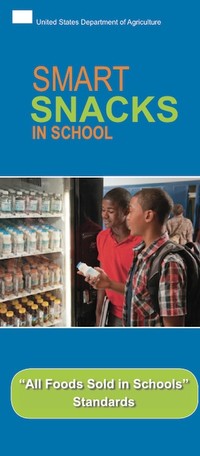Smart Snacks and Fundraisers
-
The Healthy, Hunger-Free Kids Act of 2010
requires USDA to establish nutrition standards for all foods sold in school — beyond the federally-supported meals programs. This new rule carefully balances science-based nutrition guidelines with practical and flexible solutions to promote healthier eating on campus. Click the icons below for important information regarding Smart Snacks Standards and Fundraisers.
-
THE STATE EDUCATION DEPARTMENT /
THE UNIVERSITY OF THE STATE OF NEW YORK / ALBANY, NY 12234
Office for Prekindergarten through Grade 12 Education
Child Nutrition Program Administration
89 Washington Avenue, Room 375 EBA, Albany, NY 12234
(518) 473-8781 Fax (518) 473-0018 Portal.nysed.govTo:
District Superintendents
Superintendents of Public Schools
Chief Administrators of Nonpublic Schools Participating in the
National School Lunch and School Breakfast Programs
Chancellor of New York City Public Schools
Executive Directors of Residential Child Care Institutions
Food Service Directors/Managers
School Board MembersFrom: Paula Tyner-Doyle, Coordinator
Date: September 16, 2014
Subject: Smart Snacks Standards and FundraisersThe Healthy Hunger-Free Kids Act of 2010 (HHFKA) directed the United States Department of Agriculture (USDA) to establish nutrition standards for all foods and beverages sold to students in school during the school day, including foods sold through school fundraisers.
Section 10 of the Child Nutrition Act of 1966, 42 USC 1779, as amended by the HHFKA, requires that all food and beverages sold outside of the school meals programs, on the school campus at any time during the school day must meet the nutrition standards set forth in the interim final rule titled, “National School Lunch Program and School Breakfast Program: Nutrition Standards for All Foods Sold in School as Required by the Healthy, Hunger-Free Kids Act of 2010”. This interim final rule, also known as “Smart Snacks”, was published on June 28, 2013 and is effective July 1, 2014. The rule can be accessed online at: http://www.gpo.gov/fdsys/pkg/FR-2013-06-28/pdf/2013-15249.pdf.
In accordance with Section 210.11(b)(4), the New York State Education Department (SED) is electing to establish a policy that no fundraising exemptions may be granted and is prohibiting any food related fundraisers that do not meet the nutritional standards from being held during the school day.
This approach supports the intent of the HHFKA and the Smart Snacks nutrition standards to ensure the development of healthier school environments. Implementing consistent nutrition standards throughout the school building will enhance the learning environment and contribute to the overall health and well-being of all students. In addition, consistently providing healthier foods and beverages everywhere on the school campus will build on the great strides being made in the cafeteria.
USDA has defined a fundraiser as any activity where currency/tokens/tickets, etc., are exchanged for a product in support of the school or school-related activity. For example, giving away food but suggesting a donation would be considered a fundraiser, since funds would be raised as a result.
Vending machines used to support school-sponsored clubs or activities such as the school band or football team is another example of fundraising.
Schools should be aware that selling non-food items, such as pencils or notebooks, to students and then giving them non-nutritious food items as a “bonus” or marketing the sale of nonnutritious food items to parents and teachers to be given to students during the school day undermines the intent of the law and sends inconsistent messages to students.
Although SED recognizes that fundraisers play a vital role in providing additional income to school districts to support extracurricular activities such as sports, drama and music, we strongly encourage school administrators to promote non-food fundraisers.
There are many healthy fundraising options available to schools including selling books, fresh produce, school spirit merchandise or other non-food items during the school day. Your school’s local wellness committee may have some great tips on how to raise funds and help students make healthy choices at the same time. Further guidance can be found on the USDA website at http://www.fns.usda.gov/healthierschoolday/tools-schools-smart-snacks, as well as at the Child Nutrition Knowledge Center at www.nysed.gov/cn/cnms.htm.
We appreciate your commitment in implementing the Smart Snacks standards in your schools and creating healthy learning environments for students.
The U.S. Department of Agriculture prohibits discrimination against its customers, employees, and applicants for employment on the basis of race, color, national origin, age, disability, sex, gender identity, religion, reprisal, and where applicable, political beliefs, marital status, familial or parental status, sexual orientation, or all or part of an individual’s income is derived from any public assistance program, or protected genetic information in employment or in any program or activity conducted or funded by the Department. (Not all prohibited basis will apply to all programs and/or employment activities.)
If you wish to file a Civil Rights program complaint of discrimination, complete the USDA Program Discrimination Form, found online at http://www.ascr.usda.gov/complaint_filing_cust.html, or at any USDA office, or call (866) 632-9992 to request a form. You may also write a letter containing all of the information requested in the form. Send your completed complaint form or letter to us by mail at U.S. Department of Agriculture, Director, Office of Adjudication, 1400 Independence Avenue, S.W., Washington, D.C. 20250-9410, by fax (202) 690-7442 or email at program.intake@usda.gov.
Individuals, who are deaf, hard of hearing or have speech disabilities, may contact USDA through the Federal Relay Service at (800) 877-8339; or (800) 845-6136 (Spanish).
USDA is an equal opportunity provider and employer.
If you are having trouble viewing the document, you may download the document.


